French President Nicolas Sarkozy and German Chancellor Angela Merkel have long had a testy relationship, but at the EU Summit they'll need to patch things up quickly to save the union -- and possibly their own governments.
BY MIRA KAMDAR | JUNE 17, 2010
ERIC FEFERBERG/AFP/Getty Images
Mira Kamdar is a senior fellow at the World Policy Institute and an award-winning author. She lives in Paris and writes for Courrier International and Le Monde Diplomatique.

Cold economic realities dictate that China is going to be the big player in the new Afghan gold rush -- and Washington had better wake up to that fact, soon.
BY AZIZ HUQ | JUNE 15, 2010
MINORU IWASAKI/AFP/Getty Images
Aziz Huq is an assistant professor of law at the University of Chicago. In 2002 and 2003, he worked in Afghanistan as an analyst for the International Crisis Group (ICG) and has since worked in Sri Lanka, Pakistan, and Nepal for ICG.

Posted By Andrew Light
 Wednesday, July 15, 2009 - 10:37 PM
Wednesday, July 15, 2009 - 10:37 PM

Its detractors should note: the L'Aquila conference did move vital climate change legislation forward.
By Andrew Light
If you believe recent media reports, the two international climate change meetings held last week in L'Aquila, Italy, at best failed to do anything and at worst signal that no serious progress will be made on a global climate agreement this year.
If true, this is bad news. According to the byzantine rules of the Kyoto Protocol, set to expire in 2012, a successor to that treaty must be decided this December at the U.N. climate summit in Copenhagen.
The good news is that many of the assessments of these meetings are incomplete, if not inaccurate. A New York Times editorial on Friday, for instance, based its argument in language from a draft of a declaration -- not from the document itself. The Times described the recognition by the world's major carbon emitters that temperatures should not increase more than 2 degrees Celsius above pre-industrial levels as an "aspirational" goal. They concluded that "with global climate talks in Copenhagen only five months away, aspirational goals won't carry things very far." But this weakened, "aspirational" language was struck in the final version of the document, rendering this claim obsolete.
All in all, the twin declarations emerging from the G-8 and the Major Economies Forum (MEF) indicate that progress has been made on the road to Copenhagen. So why the rush to publish such dour reports from Italy, whether accurate or not? It's simple: Invested parties had unrealistic expectations of meetings, which have no binding impact on the upcoming U.N. summit.
There were, of course, disappointments. Developed countries in the G-8 failed to agree on the medium-term goal of reducing reductions targets by 2020. Developing nations, especially China and India, refused to embrace the long-term goal of halving global emissions by 2050, a cap most of the world's leading scientists believe is essential to avoiding the worst impacts of climate change.
But if we only focus on what did not happen, we miss seeing the achievements made in a very short amount of time. When the United States rejoined the global discussion on a new climate treaty in January, it triggered an 11-month countdown to solve the most complicated problem humanity has ever faced. For the 16 countries responsible for 80 percent of carbon emissions to recognize even one marker of failure -- a rise in temperature over 2 degrees Celcius -- is fantastically impressive. A week before the Italy meetings, negotiators doubted that this language would make the final cut.
Some will argue that it's easy to agree on an abstract target like limiting planetary warming. But the G-8 struck an appropriate balance in creating objectives that are both ambitious and achievable. Industrialized countries finally determined their fair share of long-term emissions cuts: 80 percent by 2050. Plus, U.S. President Barack Obama prudently hedged on setting a 2020 emissions target. The Markey-Waxman climate change bill, which includes emissions cuts, is working its way through Congress. While it does, the president should not signal that he will preempt or undercut the legislature.
What about China and India's apparent intransigence to halving emissions by 2050? The fact is that the United States cannot criticize their behavior. If a Chinese leader had promised to join the world eight years ago in reducing carbon dioxide emissions, and then reversed course -- as former President George W. Bush did in 2001 -- the United States would hardly agree to his demands now. So it is with China and India. It will take incentives, diplomacy, and, most of all, time to bring about world-saving targets from them.
Ultimately, the most promising parts of last week's agreements received only marginal coverage. The MEF announced that developed countries will double clean-energy funding for developing nations -- putting pressure on those countries to commit to emissions reductions in exchange, as agreed upon at the Bali summit in 2007. Additionally, the participating countries agreed to determine how they will finance their plans by the G-20 meeting in September.
The countries assembled last week didn't get everything settled on the first go around. But in light of their accomplishments, we should hold off on our rush to proclaim failure.
Andrew Light is a senior fellow at the Center for American Progress in Washington, D.C., and director of the Center for Global Ethics at George Mason University.
Photo: Flickr user AmiCalmant
Posted By Fernando Carrera Castro
 Monday, July 13, 2009 - 10:28 PM
Monday, July 13, 2009 - 10:28 PM
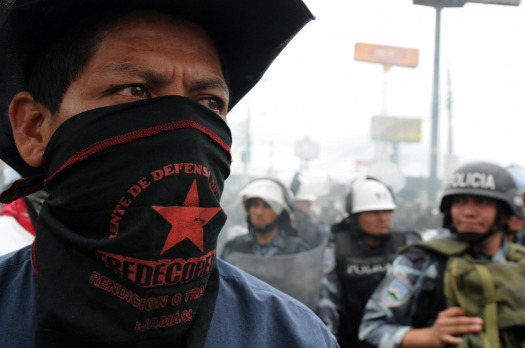
How the U.S. economic meltdown helped create a crisis in Honduras.
By Fernando Carrera Castro
The coup d'état in Honduras has received due international attention for its political implications -- and its potential to erode democracy across Latin America. Unfortunately, that's only half the story. Equally important are the economic factors that both catalyzed discontent and could now exacerbate the country's internal crisis.
Honduras is the most open economy of Central America and the one that most depends on its relationship with the United States. Exports to the United States accounted for almost a quarter of Honduras's GDP in 2007 (the second highest in Central America, after Nicaragua), according to figures collected by the Central American Institute for Fiscal Studies. Remittances from migrants amounted to 21 percent of GDP in 2008 and are expected to remain about the same this year. Meanwhile, U.S. direct investment in Honduras is among the highest in Central America. All told, Honduras's links to the U.S. economy represented close to 60 percent of the country's GDP in 2007.
Such a remarkable dependence was a blessing from 2003 to early 2008, while markets were booming and U.S. consumption was at an all-time high. But it turned out to be a major problem with the first signs of economic downturn, and since the last quarter of 2008, the situation has become a nightmare. The impact on exports, foreign direct investment, and tourism has resonated across Honduras. Businesses have gone belly up, consumer expenditure is down, unemployment and poverty are rising, and the government's coffers are running dry.
The downturn might have played well for ousted President Manuel Zelaya's increasingly populist rhetoric. But it also presented Zelaya with an awkward reality: Despite his nationalist rhetoric, Honduras would desperately need help from the United States and the international community to keep his government afloat. Calculations made in the early months of 2009 indicated that a fifth of the fiscal budget was expected to be financed with international loans and donations. By June, with the worsening economic situation and fallen fiscal revenue, this figure might have reached 35 percent. It is clear, then, that the government was not going to be able to pay its employees' salaries this year without external financial support. And this was the situation before the coup.
The current political crisis can only make matters worse (if such a situation is even possible). Any Honduran government will depend on the international community's financial support to survive in the coming year. The poorest citizens in Honduras, with one of the highest malnutrition and infant mortality rates in Latin America, might even need international humanitarian assistance if things continue on their current path.
Given this daunting situation, it is rather impressive that anyone wants to be president of Honduras at all. But if you are not poor, and your future is not threatened by the current economic crisis, you might find the presidency a very attractive job. One could ask Manuel Zelaya and Roberto Micheletti about that.
Fernando Carrera Castro is executive director of the Central American Institute for Fiscal Studies (Instituto Centroamericano de Estudios Fiscales).
Photo: ORLANDO SIERRA/AFP/Getty Images
Posted By Jason McLure
 Friday, July 10, 2009 - 7:29 PM
Friday, July 10, 2009 - 7:29 PM

It doesn't work.
By Jason McLure
As Islamist militants tighten their grip over southern Somalia, the international community is searching in vain for ways to keep the country's weak, U.N.-backed government from collapsing. The latest plan: sanctions for nearby Eritrea, which has channeled weapons to Somalia's Shabab and other Islamist militias. At the recent African Union summit in Libya, the continent's leaders reiterated their call for the U.N. Security Council to take action; condemnation of Eritrea has resonated from every corner of the globe.
There's no doubt that Eritrea has an awful government (Human Rights Watch recently labeled the country a "giant prison"). As gratifying as it may be to punish bad behavior, however, the question here is different: Would sanctions actually change this tiny dictatorial state or its delinquent behavior? It's a quandary that has plagued policymakers for decades -- from Cuba to North Korea to Burma. And despite sanctions' status as a go-to foreign-policy gadget, the answer is often no. When used on already-isolated regimes, sanctions may even be counterproductive. The Eritrean example shows us why.
Sanctions are made to cut countries off from vital international exchange. The trouble is, Eritrea already trades less with the outside world than any country in Africa and places 210th out of all 226 countries and islands for global commerce. The country's president, Isaias Afewerki, isn't interested in being a globe-trotting statesman. He regularly skips African Union summits and meetings of East African leaders. And anyway, sanctions won't deter his few, less savory allies in Libya, Sudan, and Iran who provide Eritrea with aid and diplomatic support. Sanctions will only drive the Eritrean government further into the arms of its dubious allies.
Nor will sanctioning Eritrea choke off the flow of arms and money heading toward Somalia's militants. There has been an arms embargo on Somalia for more than a decade, and it has been about as effective as a chastity belt on Silvio Berlusconi. The country has a 3,000-km coastline that the world has struggled to patrol for pirates -- let alone under-the-radar arms shipments. On land, Mogadishu is home to a dizzying array of traditional money-transfer services that keep Somalia's economy from further collapse -- and its Islamists propped up with foreign funds. Besides, as the United Nations has pointed out, both African Union peacekeepers and Ethiopian troops have apparently sold arms and equipment in Mogadishu to their ostensible enemies.
Aside from being ineffective, sanctions on Eritrea could carry a rather debilitating liability for the international community. Sanctioning Eritrea would dangerously border on taking sides in Eritrea's frozen conflict with Ethiopia, one that has stretched on in one form or another for nearly a decade. Following the two countries' border 1998-2000 war, Ethiopia refused to give back land that a U.N.-backed border commission awarded to Eritrea. So both sides took their struggle to Somalia, where Eritrea backs Islamist militias and Ethiopia props up a flailing government. Eritrea has behaved badly, true, but both countries have been arming Somali militias in a proxy war for years. The United Nations and the United States would do better to mediate the Ethiopia-Eritrea conflict rather than taking sides.
These lessons apply to sanctions on dictators more broadly. How do you punish North Korea with sanctions when its trading partners are already limited to a handful of countries -- none of which are likely to pay heed to a harsher set of rules? How do you choke Zimbabwe's Robert Mugabe when his strongest rationale for staying in power is to save his country from the hands of countries who would (and do) impose sanctions? Perhaps it's no wonder that such countries' leaders not only survive sanctions, but use them to justify bad behavior.
After 18 years of civil war, it's possible there's nothing outsiders can do to fix Somalia. Certainly, sanctions on Eritrea are not the answer. Trying to get Ethiopia and Eritrea to stop using the country as a proxy battleground would be worth a shot.
Jason McLure is a journalist based in Addis Ababa, Ethiopia. His reporting has appeared in Newsweek, The Economist, and Bloomberg News.
Photo: ASHRAF SHAZLY/AFP/Getty Images
Posted By Ann Florini and Yeling Tan
 Thursday, July 9, 2009 - 7:30 PM
Thursday, July 9, 2009 - 7:30 PM
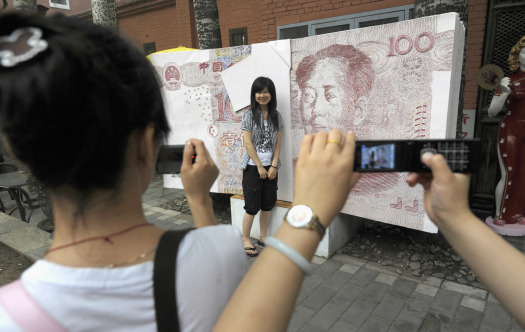
India and China are the unlikely heavyweights in a new moral battle to set the anti-corruption agenda.
By Ann Florini and Yeling Tan
Imagine the global contest for leadership as a battlefield. The front lines aren't just military and economic: Ideas are at least as crucial. And in this struggle, openness and transparency are growing ever more important. The United States, which once had an enormous advantage in terms of transparency, lost its position during the Bush-era rollback of civil liberties. Meanwhile, two surprising contenders have entered the lists.
The first is India. India's rambunctious, sprawling democracy has long been highly secretive, in keeping with colonial British traditions. But this started to change in the early 1990s, when grass-roots groups began demanding access to documents held by local governments. Day laborers, who are often left un- or undercompensated for government projects, demanded to know who else was getting paid, and how much. Villagers wanted to know why their schools remained unfinished. The movement spread rapidly, based on the notion that transparency was essential not just to liberty but to survival.
By 2005, this nationwide grass-roots campaign led to one of the world's most sweeping right-to-know laws. Indeed, the Indian Right to Information (RTI) Act is proving to be a muscular instrument for empowering citizens vis-à-vis India's notoriously ponderous bureaucracy. When police can't be bothered to accept a complaint about a theft, citizens can file RTI applications to find out why not, which often prompts the police to do what they should have done in the first place. Public works contractors must publish their contracts at their work sites, allowing local citizens to measure how work is going. The government and nongovernmental organizations have launched evaluations of the act's impacts, both still underway. But already campaigners are finding that some two thirds of focus group participants said that greater access to information would help solve many of their problems.
The far more surprising second contender is China. Conventional wisdom in the West portrays China as authoritarian, secretive, and rigid. Yet in 2008, China's State Council proactively established a set of nationwide open government information regulations. Now, via gazettes and Web sites, the government discloses an increasing array of statistics and details about health, education, budgets, economic programs, and urban planning. The same regulations allow citizens to request the release of information from the government.
This move, drawn from several years of experiments with transparency and accountability at local levels, represents a major political shift. China's system, traditionally dominated by secrecy and the rationing of information, is increasingly premised on openness and public scrutiny. One year in, the regulations are actively being used by citizens addressing grievances in land requisition, by environmental groups monitoring corporate standards, and by lawyers and public intellectuals scrutinizing everything from government toll collection to budget spending.
The sea change is likely due to strategic party calculations, rather than an embrace of democratic principles. Indeed, the Chinese Communist Party has found that secrecy can cripple its own efforts to foster growth and stability in a globalized world. For instance, China needed to improve its economic transparency to join the World Trade Organization. The global health and economic damage brought by the 2003 SARS outbreak and 2008 melamine poisoning scandal further spurred the government to become more open and stamp out malfeasance within its system.
The calculations are also domestic. China has to deal with official corruption that is not only endemic, but spreading. Its citizenry is increasingly informed, networked, and assertive. With pressures on these multiple fronts intensifying, the leadership has come to recognize that it must build in checks to its own administrative power if the country is to enjoy the economic growth and political stability upon which the party's continued dominance depends.
Thus, the contours of a new global contest are emerging. Western countries no longer have a monopoly over the definition and value of openness and disclosure. India's grass-roots approach champions transparency as a critical means of empowering the poor. China's state-driven approach wields transparency fundamentally as an alternative (rather than a prerequisite) to democratic reform. If the United States and other Western countries want to avoid losing the battle, they'll pay close attention to developments in these two countries.
Ann Florini is a professor at and director of the Centre on Asia and Globalisation at the National University of Singapore's Lee Kuan Yew School of Public Policy, and a senior fellow at the Brookings Institution. Yeling Tan is a research fellow at the Centre on Asia and Globalisation.
Photo: LIU JIN/AFP/Getty Images
Posted By ben simpfendorfer
 Wednesday, July 8, 2009 - 1:32 AM
Wednesday, July 8, 2009 - 1:32 AM
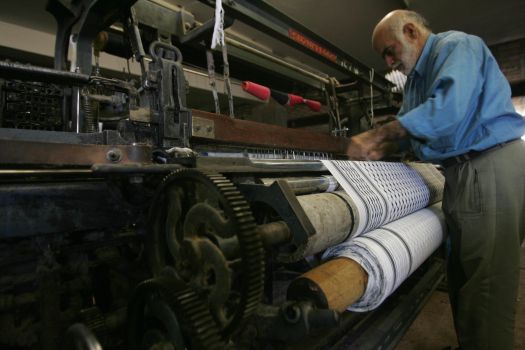
Why the Middle Kingdom's popularity is about to take a nosedive.
By Ben Simpfendorfer
China's reputation as a major economic power is growing by the day. Talk of a "G-2" symbolizes the growing importance of the U.S.-China relationship to the global economy. Financial markets are meanwhile captivated by China's speculation on the future of the dollar, while economists hope that a Chinese economic recovery will drag the rest of the world up with it.
Yet China's reputation as a leader of the emerging world is about to take a tumble: The country's exports to emerging markets are surging, and the resulting increase in cheap Chinese goods could create a long-term backlash that will undermine China's patient "charm offensive" for years to come.
Over the last five years alone, the annual value of China's shipments to Africa, Latin America, and the Middle East rose from $38 billion to $192 billion (in fact, China recently overtook the United States as the world's largest exporter to the Middle East). This surge in exports is a rational response to economic problems at home and a collapse in demand in China's traditional markets in Europe and the United States. The global economy has weakened purchasing power in the West, and the competition is less intense -- and the profit margins higher -- in the developing world.
But there is an economic and social cost to this shift in trade patterns. For now, households from Egypt to Brazil are delighted at their newfound ability to purchase ordinary goods once considered unaffordable. A new middle class is rising to meet falling prices for microwave ovens and washing machines. But the cheap imports are hurting local producers, as a flood of "made-in-China" imports shuts down factories across the emerging world.
India's largest commercial body recently noted that nearly two thirds of small- and medium-sized enterprises are suffering from the sudden rise in Chinese capital and consumer goods imports. Meanwhile, manufacturers in the Palestinian city of Hebron claim that the number of textile workers has fallen from 15,000 to 5,000. Textile factories in the Syrian city of Aleppo are closing while factory owners complain about unfair competition from cheap imports. Similar grumblings can be heard in Iran's bazaars.
China faces a dilemma. It needs to protect jobs at home to secure social stability, so it has repeatedly hiked rebates for the value-added tax applied to exports to stem the pace of factory closures. These policies appear to be working. But they could backfire if governments in the emerging world are unable to bear the economic and social costs of a flood of cheap "made-in-China" imports. Indeed, Syria has recently imposed new tariffs on textile imports, while the number of anti-dumping cases filed by India against China has jumped. So far, China has yet to adjust its rebate policy.
If Beijing can manage to strengthen the Chinese currency and economy, production will shift from China to other emerging economies, and Chinese demand for goods produced abroad will increase -- the best-case scenario for everyone. But the rebalancing will take years, if not decades.
China's status as a major economic power is rising as a result of the economic crisis. But its relations with the emerging world are about to provide an important test of its leadership qualities.
Ben Simpfendorfer is chief China economist for the Royal Bank of Scotland and author of The New Silk Road: How a Rising Arab World Is Turning Away from the West and Rediscovering China.
HAZEM BADER/AFP/Getty Images
Posted By Graciana del Castillo and Edmund S. Phelps
 Monday, July 6, 2009 - 5:43 PM
Monday, July 6, 2009 - 5:43 PM
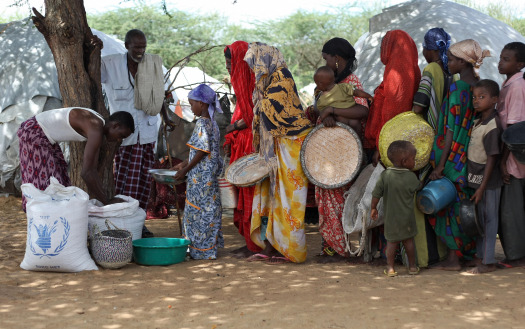
If it is to become "the next big thing," Africa will need aid.
By Graciana del Castillo and Edmund S. Phelps
With Dambiso Moyo's new book, Dead Aid, hitting the bestseller list, it's easy to see why she might have thought she could have it both ways in her recent piece for Foreign Policy. On the one hand, Moyo argues that aid to Africa has fostered dependency, corruption, and poor governance -- and even conflict, poverty, and disease; while on the other hand she tries to make us believe that Africa can quickly be "the next big thing," that it is an economic miracle in the making. Unfortunately, the paradox defeats her. As a distinguished minister of foreign affairs told former U.N. Secretary-General Boutros Boutros-Ghali when he asked whether Africa had a future: "Yes, but probably not in the 21st century." It's a dire-sounding prediction, but much remains to be done before Africa can build economies of high dynamism and wide inclusion, allowing the continent to be weaned off aid once and for all.
In examining Moyo's assessment of Africa's economic health (the vigor of which she asserts will launch its renaissance), it is hard to put aside her problematic data. Annual GDP growth rates for countries such as the Democratic Republic of the Congo (8 percent), Liberia (7.5 percent), and Burundi (4.5 percent) are not as impressive as they sound if one takes into account that these countries still have per capita incomes below $150. Even accompanied by per capita incomes hovering in the $250-to-$300 range, high growth rates in Eritrea, Ethiopia, Madagascar, Malawi, Niger, Sierra Leone, and Sudan will fail to make much of a difference in the short run. Furthermore, nominal GDP growth often does not trickle down to create better living conditions for the population at large. More generally, it benefits only the elite.
In this context, Moyo's recommendation to close down aid to African governments within five years rings hollow. She advises countries to tap financial markets for funding, as if this is a universal solution for the problems that ail the continent. But Africa is not a monolithic place. After working at Goldman Sachs on Botswana and South Africa, two high-income countries by African standards with democratic governments, Moyo seems to believe that if other African countries want to borrow from the markets at competitive rates, all they have to do is to get a rating from the accredited rating agencies. But governments with low ratings often find it difficult to issue bonds, or they have to pay astronomical rates. Going even further, Moyo assumes that all countries will have an equally easy time boosting trade, foreign direct investment, and remittances across the board. This is like recommending the same policies for Brazil and Haiti, and expecting both countries to flourish.
Not only are her recommendations misguided, they are naive, based on a dogmatic belief in the market. Countries need an effective state not only for sound macroeconomic policymaking, but also to create the institutional, legal, and regulatory framework necessary for establishing an adequate business climate and a security system that will protect society, including the vulnerable.
Just look at Mexico, where a Moyo-type prescription of increased trade and capital flows was tried out in the early 1990s with calamitous results. Huge amounts of capita -- more than $90 billion -- flowed into Mexico between 1990 and 1993, accounting for roughly one fifth of all net inflows to developing countries. The resulting growth rate was only 3.8 percent -- inadequate for Mexico's large needs in infrastructure, social development, and security. In January of the following year (1994), the North American Free Trade Agreement came into effect and Mexico fell into a deep financial and banking crisis. Its northern neighbor had to come to its rescue to stave off depression. African countries would not have such a backstop.
And African countries face challenges far beyond Mexico's. As Moyo rightly points out, Africa is a strife-prone region. Conflicts are on the rise and aid dependencies are large, even in peace. The record in Africa and elsewhere is indeed dismal. Roughly half the countries that achieve a tenuous peace return to conflict within a few years, and of the other half, the large majority remains aid-dependent. Mozambique, for example, signed its peace agreement in 1992 and still relies on aid whose levels amount to a quarter of its gross national income.
Many countries in Africa do need to reduce aid dependence and increase market-based mechanisms for financing and trade, as Moyo correctly argues. The question then is, what kind of help will be most effective at moving countries into the market without collapsing them in the meantime? And one clear winner is a specific form of assistance known as reconstruction aid that promotes investment and employment, rather than simply consumption, as humanitarian aid does. For reconstruction aid to be effective it should be targeted toward improving infrastructure, promoting start-up companies, and reactivating small enterprises, services, agriculture, and mining. There is no question that countries coming out of conflict or at low levels of development need these sorts of official flows to achieve a baseline level of service provision. Only then are investors convinced to join in.
Moyo does right in calling attention to the dismal record of aid in Africa. But her attempt to have it both ways just ends up falling apart. If Africa is to indeed be the next big thing, it will need more concrete help than Moyo is providing.
Graciana del Castillo is associate director of the Center on Capitalism and Society at Columbia University and the author of Rebuilding War-Torn States. Edmund S. Phelps is director of the Center on Capitalism and Society, winner of the 2006 Nobel Prize in economics, and the author of Rewarding Work.
Photo: MOHAMED DAHIR/AFP/Getty Images










 SUBJECTS:
SUBJECTS:
















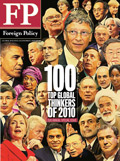
(3)
HIDE COMMENTS LOGIN OR REGISTER REPORT ABUSE